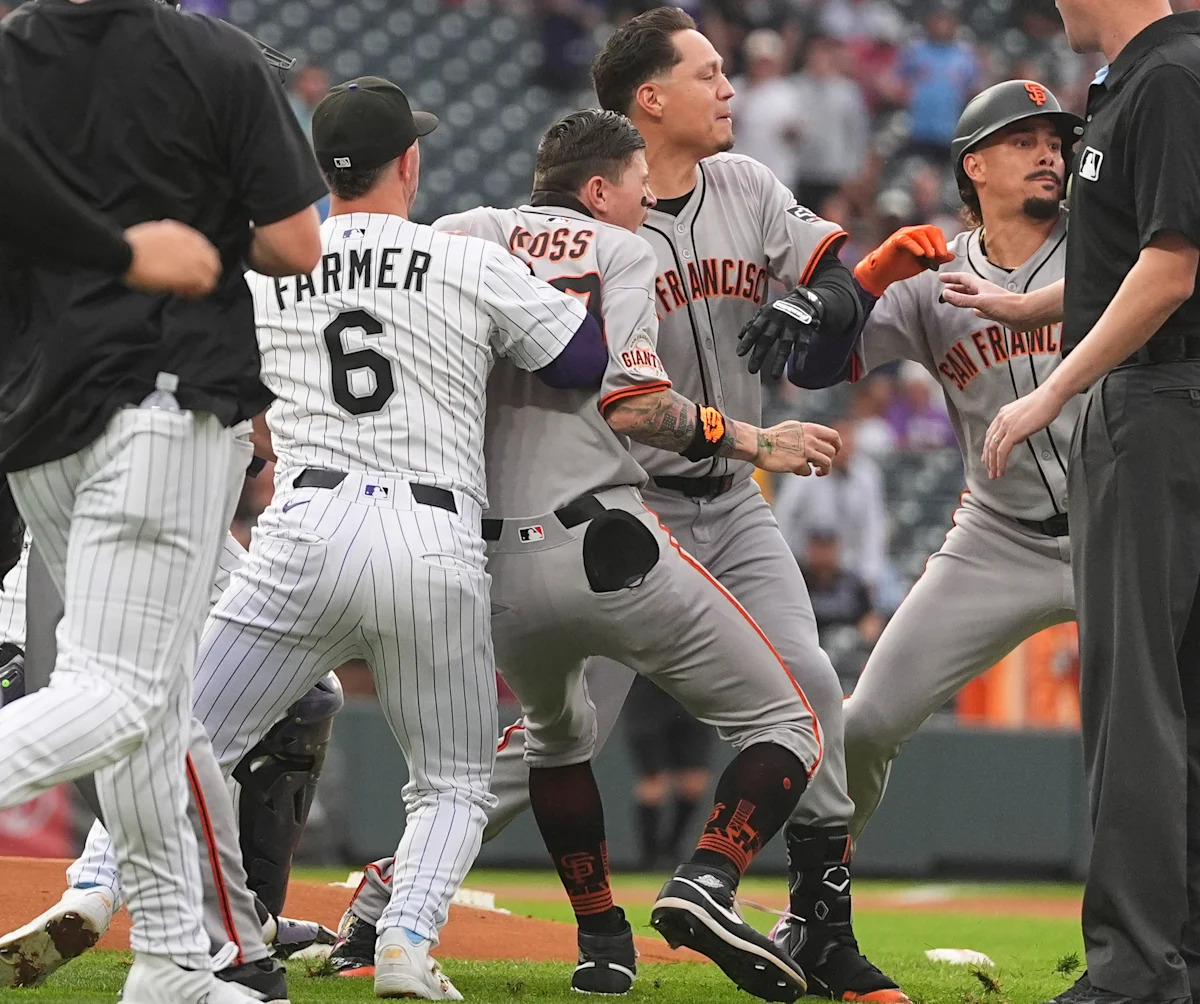Tempers flared almost immediately at Coors Field on Tuesday night as a benches-clearing brawl erupted during the San Francisco Giants’ matchup against the Colorado Rockies. The game was significantly impacted when Giants’ Rafael Devers launched a two-run homer early in the first inning, setting the stage for a confrontation that would overshadow the rest of the game.
The Problematic Reaction
The incident began with Devers’ reaction to his home run. After hitting the ball deep into the outfield, he took a moment to admire his shot, which didn’t sit well with Rockies pitcher Kyle Freeland. Such displays of emotion in MLB can often lead to controversy, as some players and teams take offense to what they perceive as a lack of respect. Before Devers could even make it to first base, he and Freeland were seen exchanging words, setting a tense atmosphere on the field.
The escalation of tensions is not uncommon in baseball; however, the quickness with which this situation boiled over must be noted. As Devers approached first base, the verbal jousting transitioned into a physical altercation as players from both teams rushed in to separate the two. The melee escalated to a level where punches were thrown, proving that in the heat of competition, pride and emotions often override decorum.
Umpires intervened swiftly, and their efforts to restore order resulted in multiple ejections. Freeland was sent packing for his role in the brawl, and Giants’ players Matt Chapman and Willy Adames also found themselves on the way to the locker room. This not only highlighted the immediate consequences of heated rivalries but also raised questions about the implications of such skirmishes on the teams involved.
Game Implications
Despite the chaos, Devers’ home run counted. After tempers cooled down, he returned to the field to complete his trip around the bases—another element of the incident that illustrates the unpredictability of baseball. But beyond the drama, the game itself had significant implications for both teams.
At this point in the season, the Rockies were struggling with a 39-99 record, the worst in Major League Baseball. They have already been eliminated from postseason contention, which often translates into heightened frustrations among the players. An incident like this could serve as a boiling point for a team that has faced criticism and adversity throughout the season.
On the other hand, the Giants entered the game with a flicker of hope, sitting third in the NL West, but trailing five games back from the final wild-card spot. Their recent form, winning eight of their last nine games leading into the contest, had elevated expectations. A disruptive brawl could be detrimental to their momentum, especially since chemistry and morale are often key components of a successful playoff push.
Broader Implications for MLB
The incident also raises questions regarding the culture of MLB, particularly concerning respect between players. Reactionary brawls like this often prompt discussions about the unwritten rules of baseball, the importance of respect on the field, and how players handle moments of triumph and defeat.
In recent years, baseball has seen an increase in dramatic home runs celebrated by players. This evolving culture can clash with traditional expectations, leading to confrontations like the one witnessed on Tuesday. As the league continues to grapple with player expressions of individuality and emotion, incidents of this nature may become more prevalent.
Potential Consequences
Moving forward, Major League Baseball might face calls for stricter penalties regarding brawls on the field. With tempers flaring at an alarming rate, the league may need to consider further disciplinary actions not only for players involved but possibly for coaches as well. The focus could shift from merely addressing the brawl itself to examining the underlying tensions that lead to such expressions of anger.
Teams will also need to evaluate their approach to conflict and camaraderie as the climate within the sport continues to evolve. As shown in the confrontation between Devers and Freeland, teams are sometimes filled with frustration, and finding ways to channel these emotions positively could be crucial for both players and organizations.
Conclusion
In conclusion, the benches-clearing brawl at Coors Field serves as a vital touchpoint in understanding the complex dynamics of modern baseball. Rafael Devers’ two-run homer ignited tensions that spiraled into a full-fledged confrontation, painting a picture of an emotional and intense sport navigating the fine line between competition and respect.
For the Rockies, this may have been a moment that highlights their frustrations during a disappointing season, while for the Giants, it raises concerns about maintaining their momentum in a tightly contested playoff race.
As MLB grapples with its evolving culture and the balance of tradition and modern expression, the fallout from events like this will continue to resonate both on and off the field. Whether changes in policy, player behavior, or cultural attitudes emerge from this brawl will be something to monitor as this season unfolds. The unpredictability of baseball—emotional, passionate, and sometimes chaotic—remains a central charm of the game, reminding everyone that while excellence is the goal, human emotions often play an indispensable role on the diamond.
Source link










